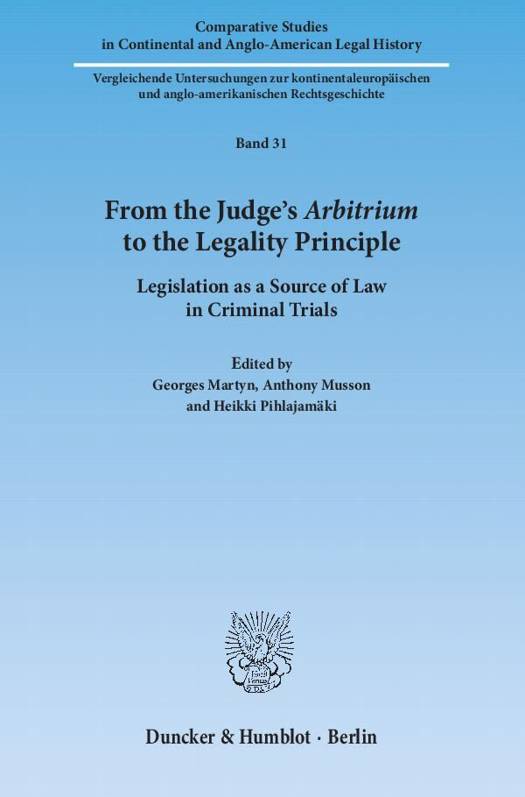
En raison d'une grêve chez bpost, votre commande pourrait être retardée. Vous avez besoin d’un livre rapidement ? Nos magasins vous accueillent à bras ouverts !
- Retrait gratuit dans votre magasin Club
- 7.000.000 titres dans notre catalogue
- Payer en toute sécurité
- Toujours un magasin près de chez vous
En raison de la grêve chez bpost, votre commande pourrait être retardée. Vous avez besoin d’un livre rapidement ? Nos magasins vous accueillent à bras ouverts !
- Retrait gratuit dans votre magasin Club
- 7.000.0000 titres dans notre catalogue
- Payer en toute sécurité
- Toujours un magasin près de chez vous
From the Judge's Arbitrium to the Legality Principle
Legislation as a Source of Law in Criminal Trials
Livre broché | Anglais | Comparative Studies in Continental and Anglo-American Legal History | Comparative Studies in Continental and Anglo-Ameri | n° 31
98,45 €
+ 196 points
Description
The legality principle characterizes all western legal systems, and it has become an integral part of the Western rule of law and the international human rights law. The principle dates back to enlightened jurists such as Cesare Beccaria and to social contract thinkers such as Charles de Secondat de Montesquieu, according to whom judges were to act only as the mouthpiece of the statutory law. Paul Johann Anselm von Feuerbach, the inventor of the famous maxim nullum crimen, nulla poena sine lege, developed these thoughts further. The emergence of the legality principle links closely to the teachings on the division of powers. The studies of this volume cover most of Europe from England, Italy and Spain to Sweden, Russia and England, and both the South and North American continents. In most parts of Europe, the nineteenth-century criminal law reforms form an integral part of the liberal agenda. These changes took place, however, at different times in different parts of the Western world, and for slightly different reasons. Comparative legal history shows, furthermore, that the roots of the principle date much further back in history than the eighteenth century. Before the formulation of the legality principle, written statutes already played a significant role in the criminal law in many parts of the Western world. The articles of the volume, written by the foremost experts on comparative legal history, demonstrate that the attitudes and practices toward written statutes as sources of criminal law varied greatly from one region to another. In most parts of the European continent judicial arbitration was carefully defined in legal scholarship (Italy, France), whereas in some regions written law played an important role from early on (Sweden). Although the nineteenth century was fundamental in shaping the legality principle, in some countries its breakthrough remained even then far from complete (Russia, the United States).
Spécifications
Parties prenantes
- Editeur:
Contenu
- Nombre de pages :
- 407
- Langue:
- Anglais
- Collection :
- Tome:
- n° 31
Caractéristiques
- EAN:
- 9783428140183
- Date de parution :
- 22-04-13
- Format:
- Livre broché
- Format numérique:
- Trade paperback (VS)
- Dimensions :
- 155 mm x 231 mm
- Poids :
- 5388 g

Les avis
Nous publions uniquement les avis qui respectent les conditions requises. Consultez nos conditions pour les avis.





